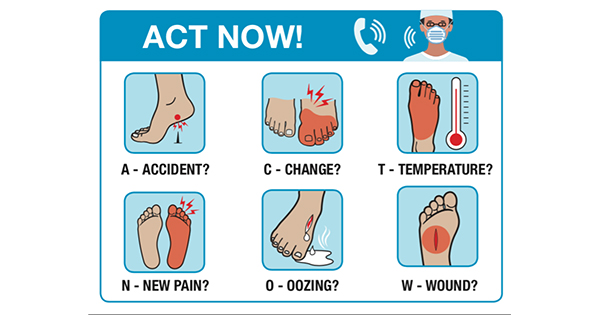Diabetes is one of our greatest health challenges. It imposes a burden of £10 billion on the NHS, of which an estimated 80% is spent on treating potentially avoidable complications.
As well as this financial burden, these complications place an immense burden on those who have to live with diabetes. Heart disease, stroke, blindness, kidney failure, depression and dementia are all life changing illnesses. And readers of The Diabetic Foot Journal will know all too well of the burden of foot disease, including amputations.
This burden means that it is incumbent on NHS leaders, and those who influence the direction of NHS policy, to ensure that wherever an intervention can take place to protect people from diabetes-related complications, it happens. Diabetic foot disease, in particular, is a strong predictor of premature mortality, and so effective care truly saves lives.
To its credit, the current government has taken action. In 2015, the Secretary of State for Health, Jeremy Hunt, set in train the development of the new NHS scorecard. This prioritises a focus on the effective treatment of diabetes — including achieving NICE-recommended treatment targets. We all hope this focus is already reducing the burden of diabetic foot disease.
Previous governments have contributed significantly to improvements in diabetes care too. I pay tribute to the work of the coalition government in overseeing the development of NHS England’s first ever action plan on diabetes, and to the last Labour government, which developed the first ever National Service Framework for people living with diabetes.
But, of course, no action would be taken — by politicians of any colour — if it was not for the work of the experts in diabetes care who identify gaps in existing services and suggest ways that they can be addressed. Frontline clinicians and national leaders, like Professor Jonathan Valabhji and Dr Partha Kar. And, of course, people living with diabetes.
These leaders and campaigners have proved resolute in their determination to ensure improvements are made in services for people with diabetes, year after year. And it is thanks to their efforts that the government has found several million pounds to support improvements in foot care services for people with diabetes this year. The same is true for next year too, and the excellent All Party Parliamentary Group for Diabetes must be applauded for its work in bringing campaigners together to secure this investment.
But this money will only deliver benefits if it is spent effectively, and this requires scrutiny of its use, and the design of clear and practicable recommendations to ensure the benefits it brings are not lost.
That is why the work of the Diabetes Think Tank is so important. Kindly supported by Sanofi since it was established in 2008, the Think Tank brings together experts in diabetes care to discuss and debate these challenges, and to bring them to the attention of policymakers. I am proud to now chair its meetings, following in the footsteps of my predecessors Pauline Latham, Lord Harrison and its founding Chair Adrian Sanders.
At our most meeting in July this year, we discussed the ways in which the promised extra investment in foot care services can best deliver on its aims. As a result, the Diabetes Think Tank is now aiming to showcase examples of its best practice use, working in partnership with NHS England and Diabetes UK. We have learnt that the NHS in London is creating a dashboard to demonstrate progress — including reductions in the incidence of minor and major amputations — and hope to see this emulated across the country. And we anticipate working closely with NHS Improvement’s ‘Getting It Right First Time’ programme to drive progress further and faster.
Our next challenge — working in partnership with others in the diabetes community — is to ensure that wherever possible further extra funding to support improvements in foot care services is found, including beyond next year. In the coming months, we will take this case, underpinned by the weight of the Diabetes Think Tank’s combined experience and expertise, to ministers and NHS leaders.
But we can always do with more support. That is why we urge readers of this journal to make their own representations to Steve Brine MP — the minister responsible for diabetes care — by writing to him to demand continued government support for improvements in foot care services.
In the months ahead, I hope to be able to say at a Diabetes Think Tank meeting that our campaign has been successful and our work worthwhile, and that further investment has been found. It would represent a further step in the efforts to improve the care of people living with diabetes, which many have championed for many years.





